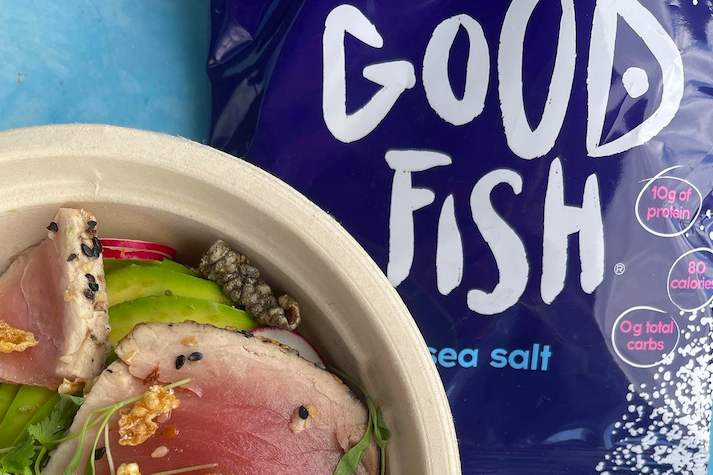
One of the best-known survivalists and outdoor adventurers, Bear Grylls, has teamed up with Goodfish, a leader in the sustainable seafood movement. Goodfish recently launched its “upcycled” wild-caught salmon skin products, thereby creating a new category of seafood snacks that include flavor combinations such as miso teryaki, chili lime and cranberry.
“What GoodFish is doing is so desperately needed in the world of ecological, healthy snack, nutrition,” said Grylls in a recent public statement. “With incredible innovation for good health and great sustainability, GoodFish is rethinking the snack and chip market, in terms of good fat and protein sources, and contributing to making the fishing industry much more environmentally friendly. It’s a genius pioneering endeavor with such huge potential, and they taste amazing.”
The wild sockeye salmon skin used in the crispy snacks is sourced from Bristol Bay, Alaska, which offers bountiful salmon runs because of its remote nature and the lack of industrial development. Unfortunately, the bay is under threat of the proposed Pebble Mine project, which critics say will have a severe impact on the fishery and the surrounding environment.
Goodfish imparts a strong dedication to protecting the environment in its marketing efforts. As its website states, “We believe the best way to protect Alaskan fisheries is by increasing their revenue and economic independence.” Producing high-value goods from what would otherwise be all that discarded salmon skin is an excellent avenue for achieving this, especially if its products don’t result in extracting more fish from Bristol Bay.
According to the company’s website, 2 billion pounds of salmon are discarded in Alaska annually. Goodfish takes what would have otherwise been wasted and make them into high-protein snacks. Each bag contains only a few ingredients: salmon skin, organic palm oil, sea salt and seasonings.
Goodfish partnered with Palm Done Right to source sustainable palm oil. In recent years, environmentalists have scrutinized palm oil for destroying wildlife habitat because it is a major driver in deforestation in some of the world’s most biodiverse forests. Yet, according to Palm Done Right, palm oil can “be one of the most sustainable and beneficial oils in the world, nurturing animals, people, communities and the environment.” It all comes down to the scale and practices that farmers use.
Goodfish’s nutrient-dense salmon skin snacks are also in line with the ongoing food trends including eating fewer carbs, more protein and foods high in Omega-3s. Salmon skin is also rich in marine collagen, which is a popular supplement over such claims that it helps build muscle mass and boost skin elasticity.
Partnering up with Bear Grylls is fitting, given his values and the type of snack Goodfish produces. The Emmy-award nominee, who is also the host of National Geographic's "Running Wild with Bear Grylls" and Discovery Channel's "Man vs. Wild," has made it out alive of some of the most hostile environments on the globe. Grylls’ witty personality draws audiences into a world that he’s on a mission to protect through education and awareness.
“We see so many people debating climate change” said Grylls in a 2019 interview about one of his productions, Hostile Planet. “‘Is it real? How bad is it, really?’ Obviously, the best way is to let the animals tell the stories. It’s heartbreaking – really heartbreaking. I don’t often have tears when I’m taking people out on the other shows, but to see these animals? Really heartbreaking.”
Image credit: GoodFish/Facebook

Sarah Lozanova is an environmental journalist and copywriter and has worked as a consultant to help large corporations become more sustainable. She is the author of Humane Home: Easy Steps for Sustainable & Green Living, and her renewable energy experience includes residential and commercial solar energy installations. She teaches green business classes to graduate students at Unity College and holds an MBA in sustainable management from the Presidio Graduate School.














